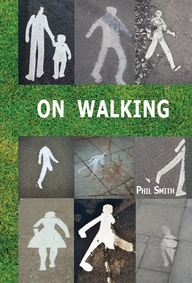On Walking... and Stalking Sebald
|
"Just to say how much I'm enjoying On Walking. I bought it a couple of months ago but only started it at the weekend... It's wonderful, thank you."
Joe McGann of The Upper Hand "...an honest and emotional account of Phil Smith´s passion for walking as a priviledged way of being in the world, being OF the world. You will find tips for walking, treasured memories, descriptions of places, poems, notes on the work of other walkers, clear renderings of theoretical concepts related to the practice of walking and prompts for creative walking and looking..."
From Walking and Art - Read the full review "Currently reading ‘On Walking’ by Phil Smith which gives a very different perspective on walking, highly recommended."
Marged Pendrell at RetakeReinvent "On Walking... is a lovely little book. Hardback. Color photographs. But that bit of lily-gilding, though tactilely and visually appealing, is almost besides the point.
In On Walking, Phil Smith redefines the experience and possibilities of what we know as the simple pleasure and reward of going for a walk, pretty much totally. It is a dense little book, filled with literary references and philosophical inquiries into the nature of everything, because Phil Smith is such a man: literate, philosophical, but, for our purposes, most importantly deeply playful and playfully deep. He is a poet as much as he is a thinker and playwright. Early on in the book, he makes these skills, as well as the focus of this book, delightfully vivid: Walk upset Walk spoiled Walk spilled Walk becoming ghost Walk winningly Parade up your own aisle Carry your heart for a while Cradle a deeper organ … Walk like water behind a dam Walk released Call into the grocery store as if it were your favorite museum Walk like a breaker Walk like a ball Walk absurd Walk unheard … Walk It’ll take time to read this book. Some parts will, at first, seem too obscure. Others perhaps too strange. Be patient in your journey. Be gentle with yourself. Roam around a bit if you need to. Skip chapters. Rest for a while on a page or a thought. Go for frequent walks. The journey, as Phil Smith points out so brilliantly, is, in deed, the reward." Bernie De Koven ~ Read the full review “bound to become an indispensable companion to the walking artist”
Airspace Gallery, Stoke-on-Trent "Phil Smith a.k.a. Crab Man, Mythogeography, Anton Vagus serves a dish of captivating journey which you can follow in an (un)linear way and the key to that follows through your own individual way of exploring it. Hence the fact that the multi-layered guidebook on how to find the meaning of the journey is effortlessly erratic (?) in a tempting way to lose yourself...
Psychogeography in its primeval form of situationist origin was derivative of surrealism and dada. Crab Man gives a completely new angle on the matter which the reader might find both encapsulating and confusing at the first read especially when you are not into the counter-cultural bibliography. The second, more straightforward layer is a story of a trip in the footsteps of W.G. Sebald - an author of "Rings of Saturn" - an account of his walk around Suffolk, U.K. The analogue self-updating vessel of finding stories, references in left-overs, self-references thoughts and ramblings, eruditive wireless globe of microcosms found both in a verse and a puddle, in a found toy or a visage that appears behind the shadow of every-day routine of repeated paradigms of un-scholastic street gnosis, well-trodden paths of silenced movements, not daring enough to create a symphony about it but intriguing enough to make a personal landmark in a pursuit of symbolic understanding. Given the fact that the layout of the book is so dense - it's definitely a wonderful read to follow on your own and encourages to self-expressed intuitive trail of...(...)" Hubert Heathertoes - Read the full review "If you are of a philosophical frame of mind two books are out that might keep the little grey cells working. Neither are easy reads, both being more akin to struggling up a steep hillside, panting away, but catching the occasional glimpses of a beautiful view, noticing something fascinating by the path or having the odd original thought. A Philosophy of Walking by Frederic Gros is perhaps better dipped into rather than read front to back, as it feels like a collection of essays rather than a structured argument. There are well researched sections on the likes of Nietsche, Rousseau, Rimbaud and Thoreau and on particular types of walking, such as the pilgrimage or strolling in public gardens. The author is prone to making sweeping statements in a manner that probably sounds more appealing in the original French, but parts of it are illuminating in a somewhat piecemeal way.
Phil Smith’s On Walking has an altogether more personal touch, picking up on his longstanding career in performance and theatre and any number of intellectual interests, from Situationism to psychogeography. The journey is constructed around a re-walking of German writer W.G.Sebald’s semi-fictional account of a walking tour in Norfolk, ‘The Rings of Saturn’. There’s a little bit of standard walking journal here but with plenty of strange mental diversions, which you will either find intriguing or simply annoying. Smith sets out to subvert everything that’s ‘normal’ about going for a walk, so of course you get what you pay for in that respect. Quite good fun, but only if you like this sort of thing." WalkingWorld.com - Read the full review |

